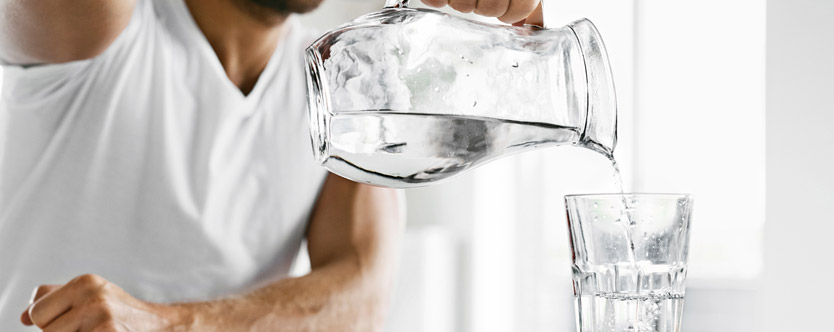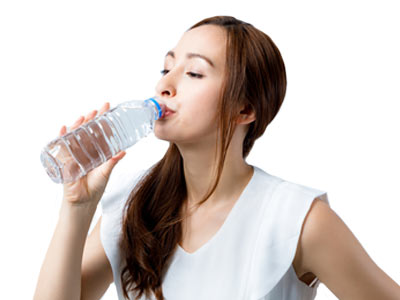
WATER FACTS
Water comprises two-thirds of our body mass. Therefore it is important for us to know how much water we should consume daily and when is the best time to consume it.
Nature has provided us with different types of water and each has its own unique quality. Water from wells is more mineralised. Rain water is light and in the early part of the last century was pure and considered fit for drinking. Now a thick band of pollution encircles the earth and as rain water falls down it picks up dust, smog, lead, pollutants, germs and a host of toxins. Water from springs has it own unique set of minerals specific to that spring. Some of these have healing properties. River and lake water picks up pollutants encountered in its journey. If river water is collected from the mountains at its source, it may be pure. But if it passes through villages and towns, it may get contaminated on its way.
Water can be made free of toxins by purifying it. Distilled water is the most pure form of water. Water when evaporated leaves behind all residues. The residue free evaporated water is then condensed and the vapour is known to be 100% pure water. This is the best from of drinking water. Water filters are able to remove suspended particles. The minerals existing in water and water soluble toxins and chemicals gets into the filtered water. However, if the water is free of soluble toxins like nitrates and nitrites then filtered water is nearly safe for drinking.
How much: The amount of water one consumers influences long term health. Sufficient water intake helps to flush out toxins. One should drink water according to the body’s demand. Mostly those who consume excessive animal products like egg, meat, fish and chicken experience excessive thirst. But with the hectic lifestyles, one tends to miss out on the body’s thirst signals. Most often people often forget to drink water or consume very little. This insufficient water consumption may lead to accumulations of toxins, cause dryness, constipation, tensed nerves, acne, gout, kidney stones, etc. A person may also begin to feel inactive and lethargic since the body cannot perform basic cleansing activities without sufficient water. A normal healthy person should consume at least 8-10 glasses of water daily. Coconut water, lime juice, butter milk may be included in this amount. A person who is involved in a lot of physical activity or stays in the sun needs to increase his water intake to atleast 12-14 glasses a day. However, people suffering from kidney problems, water retention, hypertension need to discuss their water intake with their physicians.
On the other hand, too much water can make a weak person feel cold and affect his digestion. This in turn will adversely affect his energy levels. Some individuals have a cold constitution. They get body ache, gas, lose stools, they are intolerant to cold weather. Such individuals should not drink too much of water and follow their body’s wisdom. They feel energetic with warming foods such as hot soups with a lot of pepper, grains such as rice, jowar, bajri and non-vegetarian foods such as eggs, chicken and fish. Such people usually have a weak digestion. Too much water intake by such individuals may further weaken their digestion.
Vegetarians usually tend to need less water primarily because most fruits and vegetables are made up of 80% water. Pulses and grains when cooked also have a high water content as we add water in them when we cook. But vegetarians who eat a lot of refined sugar and maida based products along with fried and salty foods tend to suffer from acidity and their need for water also increases.
What time: The best time to drink water is when you are thirsty. However, drinking one and a quarter litre of water first thing in the morning is highly beneficial as it cleanses the body off toxins, improves skin texture and relieves constipation. Most people tend to drink water during or soon after meals. In fact in our Indian culture, it is customary to offer a glass of water to the person who has just finished eating his meals. This practice should be stopped. It is wise to drink water half an hour before meals or one hour after meals. Sipping water during meals only helps to dilute the digestive juices and the nutrients from food cannot be effectively extracted. However, if you must drink water during meals out of habit, then a few sips of warm water can be taken during meals.
thing in the morning is highly beneficial as it cleanses the body off toxins, improves skin texture and relieves constipation. Most people tend to drink water during or soon after meals. In fact in our Indian culture, it is customary to offer a glass of water to the person who has just finished eating his meals. This practice should be stopped. It is wise to drink water half an hour before meals or one hour after meals. Sipping water during meals only helps to dilute the digestive juices and the nutrients from food cannot be effectively extracted. However, if you must drink water during meals out of habit, then a few sips of warm water can be taken during meals.
Sufficient water intake helps the body to remain clean from within and determines efficient nutrient absorption from the food that we eat.
ANJALI MUKERJEE, Nutritionist, Founder Director-Health Total, having health centers
in Mumbai, Delhi, Bangalore, Pune -manages obesity & other health related disorders.
Contact numbers: 1800 8918131/+91 86575 61727
For further information, Visit www.health-total.com
